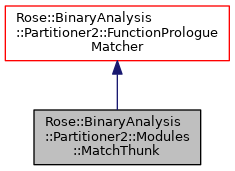Description
Match thunk.
Matches any thunk matched by the specified predicates. This callback is invoked at addresses that are not part of the partitioner's CFG and will only match instructions not in the CFG.
#include <Rose/BinaryAnalysis/Partitioner2/Modules.h>


Public Member Functions | |
| virtual std::vector< FunctionPtr > | functions () const override |
| Returns the function(s) for the previous successful match. | |
| virtual bool | match (const PartitionerConstPtr &, Address anchor) override |
| Attempt to match an instruction pattern. | |
| ThunkPredicatesPtr | predicates () const |
| Property: Predicates used for matching thunks. | |
| void | predicates (const ThunkPredicatesPtr &) |
| Property: Predicates used for matching thunks. | |
 Public Member Functions inherited from Sawyer::SharedObject Public Member Functions inherited from Sawyer::SharedObject | |
| SharedObject () | |
| Default constructor. | |
| SharedObject (const SharedObject &) | |
| Copy constructor. | |
| virtual | ~SharedObject () |
| Virtual destructor. | |
| SharedObject & | operator= (const SharedObject &) |
| Assignment. | |
Static Public Member Functions | |
| static Ptr | instance (const ThunkPredicatesPtr &) |
| Allocating constructor. | |
Protected Member Functions | |
| MatchThunk (const ThunkPredicatesPtr &) | |
Protected Attributes | |
| std::vector< FunctionPtr > | functions_ |
Additional Inherited Members | |
 Public Types inherited from Rose::BinaryAnalysis::Partitioner2::FunctionPrologueMatcher Public Types inherited from Rose::BinaryAnalysis::Partitioner2::FunctionPrologueMatcher | |
| using | Ptr = FunctionPrologueMatcherPtr |
| Shared-ownership pointer to a FunctionPrologueMatcher. | |
 Public Types inherited from Rose::BinaryAnalysis::Partitioner2::InstructionMatcher Public Types inherited from Rose::BinaryAnalysis::Partitioner2::InstructionMatcher | |
| typedef Sawyer::SharedPointer< InstructionMatcher > | Ptr |
| Shared-ownership pointer to an InstructionMatcher. | |
Member Function Documentation
◆ functions()
|
overridevirtual |
Returns the function(s) for the previous successful match.
If the previous call to match returned true then this method should return at least one function for the matched function prologue. Although the function returned by this method is often at the same address as the anchor for the match, it need not be. For instance, a matcher could match against some amount of padding followed the instructions for setting up the stack frame, in which case it might choose to return a function that starts at the stack frame setup instructions and includes the padding as static data.
Multiple functions can be created. For instance, if the matcher matches a thunk then two functions will likely be created: the thunk itself, and the function to which it points.
The partitioner will never call Function Declarations without first having called match.
Implements Rose::BinaryAnalysis::Partitioner2::FunctionPrologueMatcher.
◆ match()
|
overridevirtual |
Attempt to match an instruction pattern.
If the subclass implementation is able to match instructions, bytes, etc. anchored at the anchor address then it should return true, otherwise false. The anchor address will always be valid for the situation (e.g., if the partitioner is trying to match something anchored at an address that is not in the CFG, then the anchor will be such an address; if it is trying to match something that is definitely an instruction then the address will be mapped with execute permission; etc.). This precondition makes writing matchers that match against a single address easier to write, but matchers that match at additional locations must explicitly check those other locations with the same conditions (FIXME[Robb P. Matzke 2014-08-04]: perhaps we should pass those conditions as an argument).
Implements Rose::BinaryAnalysis::Partitioner2::InstructionMatcher.
Member Data Documentation
◆ functions_
|
protected |
The documentation for this class was generated from the following file: